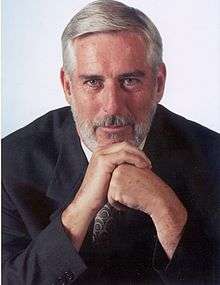Robert Ellis Smith
| Robert Ellis Smith | |
|---|---|
 | |
| Born |
September 6, 1940 Providence, Rhode Island |
| Nationality | American |
| Education |
Harvard College, 1962 Georgetown University Law Center, 1975 |
| Occupation | Attorney, publisher/journalist, author |
| Known for | Privacy, civil rights, environmental protection |
| Spouse(s) | Kathryn Ritter-Smith (divorced) |
Robert Ellis Smith (born September 6, 1940) is an American attorney, author, and a publisher/journalist whose focus is mainly privacy rights.
Robert began his career in journalism during high school and while attending Harvard.[1] He was President of The Harvard Crimson. After college, he wrote for newspapers such as the Detroit Free Press, Newsday in New York City, and the Southern Courier. He also worked for the ACLU.[2]
Since 1974, he has published Privacy Journal newsletter as well as several books, such as Ben Franklin’s Website: Privacy and Curiosity from Plymouth Rock to the Internet (2000/2004). From the book: "Just what is privacy? It is the desire of each of us for physical space where we can be free of interruption, intrusion, embarrassment, or accountability and the attempt to control the time and manner of disclosures of personal information about ourselves."
He has written Workrights (1983, E.P. Dutton),The Law of Privacy Explained (1993, Privacy Journal), and Privacy: How to Protect What’s Left of It (1979, Doubleday) [3] The 1979 book was nominated for a National Book Award.[4] For more than 35 years Smith has edited successive editions of Compilation of State and Federal Privacy Laws, which is now available in hard copy (2014), plus eBook mode as well as an edition available for loading onto hand-held devices. This allows individuals to consult their palm devices, in the workplace or the marketplace, to determine whether privacy protections cover certain transactions. He continues to write and publish Privacy Journal, and is often called to speak and testify concerning privacy rights. Smith has twice been asked to write the definition of privacy for the World Book Encyclopedia.[5]
"Privacy Journal," one of the longest running newsletters in North America, celebrated its 40th anniversary of continuous monthly publishing in November 2014. Smith is the author also of "Our Vanishing Privacy" (Loompanics Unlimited, 1993). He is co-author of "The Big Brother Book of Lists" (1984, Price/Stern/Sloan), published to commemorate the fateful year of 1984.
Smith, formerly active as a land conservationist for environmental protection, has written four editions of a quiz book called Block Island Trivia, about the tiny island off the coast of Rhode Island. In the 1990s he was president of the Block Island Conservancy, a non-profit group that purchases land to maintain it as open space.[6] And in the 1990s, he was vice chair of the Rhode Island Coastal Resources Management Council, which is responsible for preservation and orderly development of land within 200 yards of the entire coast line of Rhode Island.
It was Smith who posed as President Kennedy, fooling the crowd in a notorious stunt at the Harvard-Yale football game in 1961. Harvard–Yale football rivalry,[7][8] See "Pranks."
Early in his career, in 1965 and 1966, he edited and managed a weekly newspaper founded by young civil rights workers to cover the civil rights movement in Alabama and Mississippi, "The Southern Courier." [9] see "Reflections." He then was a consultant on press coverage of racial rioting to the National Advisory Commission on Civil Disorders. He served on the District of Columbia Human Rights Commission in the 1980s. He has taught at Brown University, University of Maryland, Harvard College, and Roger Williams University Law School.[10]
Notes
- ↑ Harvard-Radcliffe Class of 1962
- ↑ Privacy Journal
- ↑ Robert Ellis Smith entry on AuthorsDen
- ↑
- ↑ Robert Ellis Smith
- ↑
- ↑ “A Bowl Full of Memories: 100 Years of Football at the Yale Bowl” by Marazzi (2014) and “Harvard Crimson” Nov. 18, 2011.
- ↑
- ↑
- ↑ http://law.rwu.edu/robert-ellis-smith and http://www.privacyjournal.net/